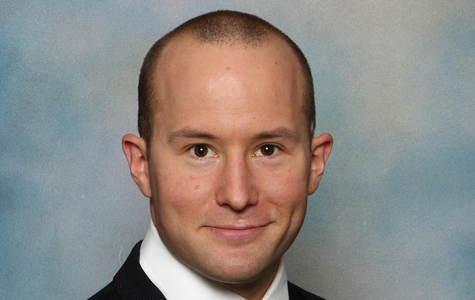Resident Spotlight: Dr. Andrew Bridgen, Psychiatry
Dr. Andrew Bridgen, PGY4 and Psychiatry Chief Resident, experienced an entirely different side of medicine and health care before deciding to become a doctor.
Although his career started as a paramedic, Dr. Bridgen says he quickly grew interested in furthering his knowledge and continuing to learn. After more advanced training, he made the switch into flight medicine, working on air ambulances in Northern Ontario. Despite taking on the exciting and prestigious position, while also teaching in the paramedic program at St. Clair College, Dr. Bridgen said he felt a different calling.

“I was looking for greater understanding. It’s not to hold one vocation in prestige over another, but there is certainly something about being considered an expert in a field. You also have the flexibility to choose your care setting or speciality,” he said.
Given his previous work experience, emergency medicine may have seemed like the obvious choice. While his familiarity with the subject matter was a major draw, Dr. Bridgen says he became fascinated with psychiatry during his clerkship, and excited by the prospect of building a closer relationship with his patients.
As a resident, he has pursued research opportunities with the Franklin MacDonald Stress Injury Research Centre, working with military veterans and first responder populations.
What initially drew you to psychiatry?
The intimacy, the way you really get to know someone. You’re often dealing with very personal, sometimes traumatizing or debilitating experiences. It’s ever-evolving, there isn’t one common pathway for each disease, and often you’re drawing on multiple disciplines.
Why did you choose the Windsor Campus for your postgraduate training?
What was interesting about the program at the Schulich Medicine – Windsor Campus is that it’s at a sweet spot in terms of size. At some very large centres, you get put in a position where there is a pecking order, and sometimes you’re so far down that you might feel removed from the learning experience. At the Windsor Campus, we’re afforded a lot of autonomy and we are supported in pursuing what we want to do. I can also access opportunities in London, such as neuroradiology rotations and my research work at the Occupational Stress Research Centre.
How do you see your role as Chief Resident?
It’s twofold; there’s the leadership aspect, in that I get to represent the resident body. I’m always trying to help out, especially with the newer residents or when issues arise. And there’s the personal aspect; it gives insight into the operations of the educational programs at Schulich Medicine. I’m at the table for a lot of committees, so I get to see how medical education and hospital departments run. It’s fascinating, and it inspires me to consider whether I have a future in administration or these types of leadership roles.
What piece of medicine-related media would you recommend to other physicians?
We get so much screen time already, so I personally prefer books. I’d recommend The Happiness Hypothesis – it takes Eastern philosophy and Western psychology, sort of wisdom and data, and weaves them together to go over key principles of life and happiness. It’s kind of like a guide to life.








